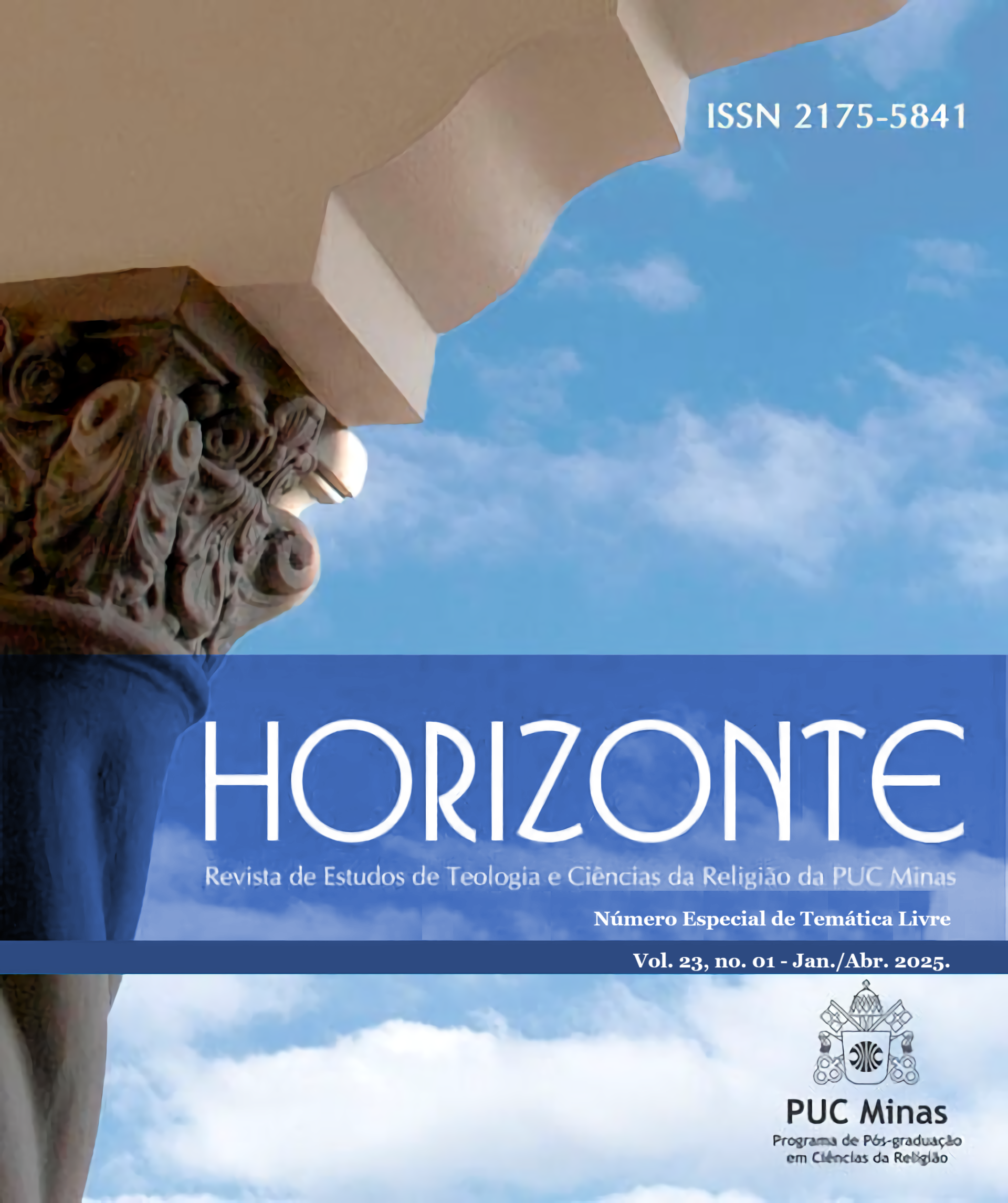Criticism of religious manipulation discourse in X-Men: God Loves, Man Kills, by Chris Claremont and Brent Anderson
Main Article Content
Abstract
The starting point of this article is the comic arc God Loves, Man Kills, by Chris Claremont (script) and Brent Anderson (art), which presents a critique of manipulation in the religious discourse. Even though this object of research is fictional, its plot is plausible, as it presents a feasible situation: an eloquent and charismatic (sociologically speaking) religious leader who is unscrupulous, uses a religious discourse to make his followers to do and feel what he wants they do and feel. The article presents the concept of manipulation, specifically in the context of religious discourse. After this, the historical context of the making of God Loves, Man Kills and an exposition of the X-Men is presented. The plot is presented and analyzed, and in the final remarks, the article points to the relevance of Claremont and Anderson’s critique, even four decades after its launching.
Downloads
Article Details

This work is licensed under a Creative Commons Attribution 4.0 International License.
There is access to:
Share — copy and redistribute the material in any medium or format Adapt — remix, transform, and build upon the material for any purpose, even commercially. The licensor cannot revoke these freedoms as long as you follow the license terms. Under the following terms:
Attribution — You must give appropriate credit, provide a link to the license, and indicate if changes were made. You may do so in any reasonable manner, but not in any way that suggests the licensor endorses you or your use.No additional restrictions — You may not apply legal terms or technological measures that legally restrict others from doing anything the license permits.
I acknowledge that Horizonte is licensed under a CREATIVE COMMONS LICENSE - ATTRIBUTION 4.0 INTERNATIONAL (CC BY 4.0):
References
ALVARENGA, Leonardo Gonçalves de. GOMES, Nataniel dos Santos. ALVES, Wellington Nascimento. O fundamentalismo cristão que apavora e manipula o universo dos X-Men: Deus ama, o homem mata. Correlatio, p. 131-148, 2023.
BELLOTTI, Karina Kosicki. A batalha pelo ar: a construção do fundamentalismo norte-americano e a reconstrução dos ‘valores familiares’ pela mídia (1920-1970). Mandrágora. Volume 14, p. 55-72, 2008.
BURKE, Peter. O que é história cultural? Tradução Sérgio Goes de Paula. Rio de Janeiro: Zahar, 2021.
CALDAS, Carlos. X-Men: Apocalipse. Ultimato Online. 27 jun 2016. Disponível em: https://www.ultimato.com.br/conteudo/x-men-apocalypse#caldas. Acesso: 25 jun. 2024.
CALDAS, Carlos. Das HQ’s como discurso teológico: análise de X-Men – Deus ama, o homem mata, de Chris Claremont na perspectiva da soteriologia de Paul Tillich. Teoliterária. Vol. 7, N. 14, p. 70-90, 2017.
CALDAS, Carlos; MANZATTO, Antonio. TEOLOGIA E LITERATURA NO UNIVERSO DAS HISTÓRIAS EM QUADRINHOS – 2ª. Parte. TEOLITERÁRIA - Revista de Literaturas e Teologias, v. 9, n. 19, p. 5-12, dez. 2019b.
CAMPOS, Breno Martins; SILVA, Saulo Inácio da. As várias faces do fundamentalismo protestante no Brasil. Por uma discussão terminológica e conceitual. Protestantismo em Revista. V. 43, N. 17, p. 3-19, 2017.
CITELLI, Adilson. Linguagem e persuasão. 11ª edição. São Paulo: Ática, 1997.
CLAREMONT, Chris (argumento); ANDERSON, Brent (arte). X-Men – Deus ama, o homem mata. Barueri: Panini, 2003.
CLAREMONT, Chris. Introdução. X-Men: Deus ama, o homem mata. Barueri: Panini, 2014.
DAROWSKI, Joseph J. X-Men and the Mutant Metaphor. Race and Gender in the Comic Books. Plymouth: Rowman and Littlefield, 2014.
DE MOYA, Álvaro. Shazam. São Paulo: Perspectiva, 1977.
DREHER, Martin N. Para entender fundamentalismo. São Leopoldo: Editora Unisinos, 2002.
DU MEZ, Kristin Kobes. Jesus e John Wayne. Como o Evangelho foi cooptado por movimentos culturais e políticos. Rio de Janeiro: Thomas Nelson, 2022.
ECO, Umberto. O Super-Homem de massa. São Paulo: Perspectiva, 1991.
HOUSEL, Rebecca; WISNEWSKI, J. Jeremy (orgs). X-Men e a filosofia. Visão surpreendente e argumento fabuloso no X-verso mutante. São Paulo: Madras, 2009.
LECKER, Michael J. “Why Can’t I Be Just Like Everyone Else?”: A Queer Reading of the X-Men. International Journal of Comic Art, 9, N. 1, p. 679-687, 2007.
MANIPULAÇÃO. In: AULETE. Dicionário Online. Rio de Janeiro: Lexicon. Disponível em: https://aulete.com.br/manipula%C3%A7%C3%A3o. Acesso em: 27 jun 2024.
MANZATTO, Antonio; CALDAS, Carlos. Editorial: Teologia e Literatura no Universo das Histórias em Quadrinhos. TEOLITERÁRIA - Revista de Literaturas e Teologias, São Paulo, v. 9, n. 18, p. 5-16, set. 2019a.
MARSDEN, George. Fundamentalism and American Culture. 2nd Edition. Oxford: Oxford University Press, 2006.
MILLER, P. Andrew. Mutants, Metaphor and Marginalism: What X-actly do the X-Men Stand For? Journal of the Fantastic in the Arts. Vol. 13, N. 3 (51), p. 282-290, 2003.
MORGADO, Alexandre. Marvel comics: a trajetória da casa das ideias no Brasil. 2 ed. São Paulo: Splash Books. 2021.
REBLIN, Iuri Andreas. O alienígena e o menino. Jundiaí: Paco Editorial, 2015.
ROCHA, Daniel. Da “minoria silenciosa” à Maioria Moral: transformações nas relações entre religião e política no fundamentalismo norte-americano na década de 1970. Religião e Sociedade. 40 (1): 91-113, 2020.
RUTHVEN, Malise. Fundamentalism: A Very Short Introduction. Oxford: Oxford University Press, 2007.
SANDEEN, Ernest R. Toward a Historical Interpretation of the Origins of Fundamentalism. Church History. Vol. 36, N. 1, p. 66-83, 1967.
TORRESAN, Jorge Luís. A manipulação no discurso religioso. Dialogia. Vol. 6, p. 95-105, 2007.
VERGUEIRO, Valdomiro. Muito além dos quadrinhos. São Paulo: Devir, 2009.
VERGUEIRO, Valdomiro. Pesquisa acadêmica em histórias em quadrinhos. São Paulo: Criativo, 2017.


